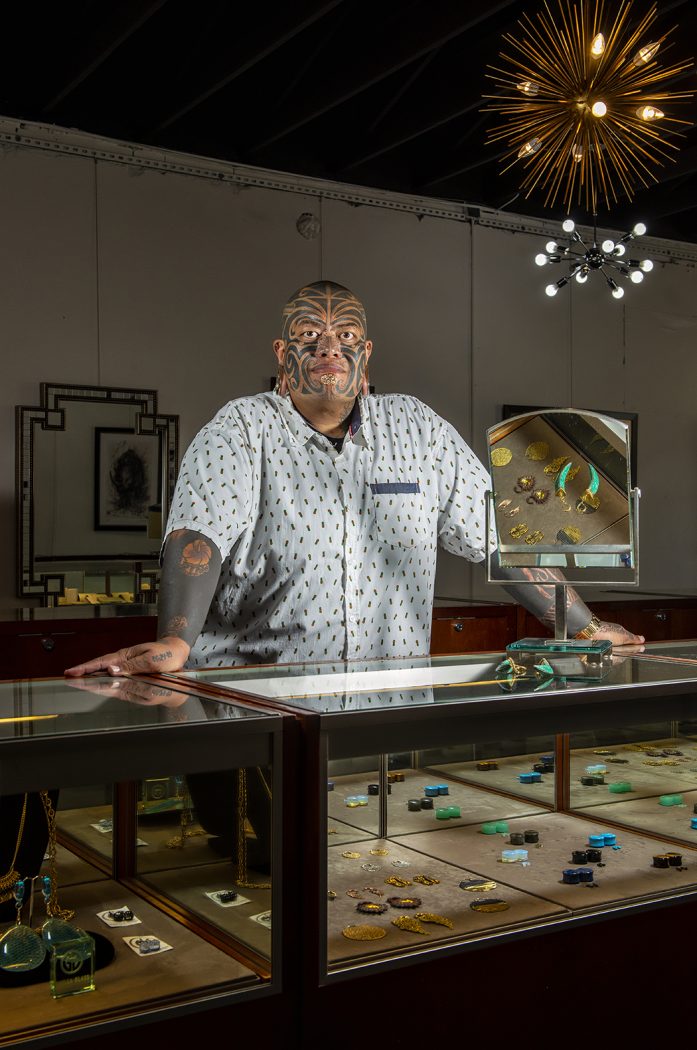
Photography by Danny Fulgencio.
Pineapple Tangaroa’s face stops people on the street. Tattoos frame his eyes and mouth in dark symmetrical ink. Oversized plugs grace his earlobes, and a large gold Wu-Tang logo pierces below his bottom lip.
Tangaroa owns Shaman Modifications, which opened this year in a refurbished 1920s era building at Fitzhugh and Terry in East Dallas. He did much of the work on the piercing studio himself, and he decorated it with art from his private collection, including a David Bowie portrait and works by street artist Shepard Fairey. Tangaroa owns several body modification shops in Dallas and Austin and is a leader in the industry.
Raised by his grandparents in Brooklyn, Tangaroa was introduced to body modification by his Maori grandfather and Samoan grandmother, who had traditional tattoos. He got his first tattoo at age 13, when he paid a homeless person to pose as his father while the artist put a backward and discolored Thundercat character on his body.
In college, Tangaroa studied anthropology and learned about ancient Meso-American cultures. He says followers used ceremonial piercing, tattoos and branding to bring shamans into a state of ecstasy and allow them contact with the gods.
In many Pacific-Islander communities, he says tattoos are used to identify a person’s place in society and their familial history. Tangaroa’s grandmother received a Ta Moko, the traditional facial tattoo, when she married her Maori husband. The Australian Museum says that the original Ta Mokos were chiseled into the skin with an albatross bone and inked with soot and oil.
Tangaroa’s tattoos are influenced by the Polynesian style but do not communicate his familial history. “I felt like I did not want to completely imitate what was culturally correct,” he says. “I don’t want to steal their culture and participate in cultural appropriation.”
In 2006, he began piercing in Austin, but after returning from vacation, he learned the location was closing. He sold his motorcycle, bed, couch and television, but made the rent. “My apartment was completely empty, and I slept on an air mattress until my dog poked a hole in it. Then it was a sleeping bag,” he says.
He started small and focused on quality over quantity. He chose only the best jewelry and made sure to choose metals that were hypoallergenic. His reputation grew with his business. Today he owns two Austin locations as well as the one in East Dallas.
Tangaroa’s extensive body art helped transform how he interacts with the world. He went from a shy youth to an outgoing business owner. His body art also helped him launch a side career in Hollywood. A former client who is a casting director helped him land several roles. He played a bodyguard in “Song to Song,” where he danced with Natalie Portman, and he has been in the USA series “Queen of the South” as well as the movie “Puncture” with Chris Evans.
The name Pineapple comes from a nickname his grandfather gave him when Tangaroa came back from a punk show with a prominent Mohawk hairstyle. It is now his legal name. He has a metal pineapple-shaped implant in his chest, as well as pineapple tattoos. He also has a split tongue and a Wu-Tang logo implanted under the skin in his hand, a feature that propelled him onto Wu-Tang rapper Ghostface Killah’s Instagram feed after a concert.
Tangaroa knows he is an emissary for the world of body modification. He is married with two stepchildren, two sons and a grandchild. He says he expects a few looks when he is out with the family. “I didn’t ask to be an ambassador for the body modification world, but it comes with the territory. I have to go above and beyond and kill them with kindness.”






